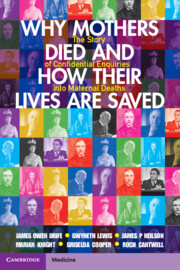 Why Mothers Died and How their Lives are Saved
Why Mothers Died and How their Lives are Saved Book contents
- Why Mothers Died and How Their Lives Are Saved
- Why Mothers Died and How Their Lives Are Saved
- Copyright page
- Contents
- Contributors
- Foreword
- Foreword
- Introduction
- 1 Historical Background
- 2 THE FIRST STEPS: 1900–1939
- 3 How the Confidential Enquiries Evolved
- 4 THE MISSING CHAPTER? PROLONGED LABOUR AND OBSTETRIC TRAUMA
- 5 HOW THE CHANGE BEGAN: THE STORY OF SEPSIS
- 6 Haemorrhage Then and Now
- 7 HYPERTENSION: ENQUIRIES, TRIALS AND RECOMMENDATIONS
- 8 The Story of Abortion
- 9 CHALLENGING TRADITION: THE STORY OF EMBOLISM
- 10 Pregnancy and Illness
- 11 Maternal Death due to Anaesthesia
- 12 Psychiatric Illness
- 13 THE MOTHERS WHO DIED: SOCIAL DETERMINANTS OF MATERNAL HEALTH
- 14 THE LEGACY IN THE UNITED KINGDOM: THE CONCEPT OF ‘NEAR MISS’ AND THE NEED TO KEEP SAVING LIVES
- 15 International Maternal Health: Global Action
- 16 International Action: Personal Views
- Figure Permissions
- Further Reading
- Index
12 - Psychiatric Illness
Published online by Cambridge University Press: 05 April 2023
- Why Mothers Died and How Their Lives Are Saved
- Why Mothers Died and How Their Lives Are Saved
- Copyright page
- Contents
- Contributors
- Foreword
- Foreword
- Introduction
- 1 Historical Background
- 2 THE FIRST STEPS: 1900–1939
- 3 How the Confidential Enquiries Evolved
- 4 THE MISSING CHAPTER? PROLONGED LABOUR AND OBSTETRIC TRAUMA
- 5 HOW THE CHANGE BEGAN: THE STORY OF SEPSIS
- 6 Haemorrhage Then and Now
- 7 HYPERTENSION: ENQUIRIES, TRIALS AND RECOMMENDATIONS
- 8 The Story of Abortion
- 9 CHALLENGING TRADITION: THE STORY OF EMBOLISM
- 10 Pregnancy and Illness
- 11 Maternal Death due to Anaesthesia
- 12 Psychiatric Illness
- 13 THE MOTHERS WHO DIED: SOCIAL DETERMINANTS OF MATERNAL HEALTH
- 14 THE LEGACY IN THE UNITED KINGDOM: THE CONCEPT OF ‘NEAR MISS’ AND THE NEED TO KEEP SAVING LIVES
- 15 International Maternal Health: Global Action
- 16 International Action: Personal Views
- Figure Permissions
- Further Reading
- Index
Summary
From 1994 to 1996 the Enquiries had a psychiatric assessor, Prof. Channi Kumar, followed by Dr Margaret Oates. Regional assessors followed in 2006-8. The importance of psychiatric illness was recognised by WHO in 2012 when suicide was categorised as Direct death. Suicide and substance abuse are the main causes. Most deaths are Late (> 42 days after birth) and under-reporting is a problem. All social classes are at risk of suicide but social deprivation increases the risk of death from substance misuse. Screening for mental health disorder is now standard practice at booking. Good communication between primary care and maternity services is essential. Red flag indicators of risk should lead to review by a senior clinician and possible referral to a mother and baby unit. Risk factors include failure to restart medication after pregnancy. Each area should have a clinician responsible for the perinatal mental health service. The 2009-13 Report recommended regional networks to coordinate care. Rapid referral may be needed and the 2017-19 Report identified a lack of clear pathways into care. Management of substance misuse needs integrated multidisciplinary specialist services.
Keywords
- Type
- Chapter
- Information
- Why Mothers Died and How their Lives are SavedThe Story of Confidential Enquiries into Maternal Deaths, pp. 153 - 163Publisher: Cambridge University PressPrint publication year: 2023


